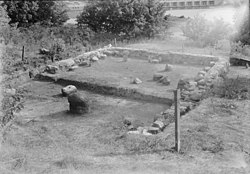Lac qui Parle State Park
Lac qui Parle Mission Site | |
 Lac Qui Parle Mission Church (Ruins) | |
| Location | Lac qui Parle County / Chippewa County |
|---|---|
| Nearest city | Watson, Minnesota |
| NRHP reference No. | 73000971[1] |
| Added to NRHP | March 14, 1973 |
Lac qui Parle State Park WPA/Rustic Style Historic District | |
| Location | Off Co. Hwy. 33 at SE end of Lac qui Parle, Lac qui Parle Township |
|---|---|
| Nearest city | Montevideo, Minnesota |
| MPS | Minnesota State Park CCC/WPA/Rustic Style MPS |
| NRHP reference No. | 91001055 |
| Added to NRHP | August 19, 1991 |
Lac qui Parle State Park is a Minnesota state park near Watson. Lac qui Parle is a French translation of the native Dakota name, meaning "lake which speaks". In the 19th century, the first dictionary of the Dakota language was written, and part of the Bible was translated into that language for the first time at a mission on the site of the park.
The state park was built as part of the Lac qui Parle Flood Control Project. Lac qui Parle Lake is a widening of the Minnesota River, and the flood control project involved building a dam at the south end of the lake. The dam was constructed by the Works Progress Administration, and other projects were built along the lake. Besides the dam and the state park, other projects included the Watson Wayside, Lac qui Parle Parkway, and the reconstruction of the Chippewa Lac qui Parle Mission. Three structures are included in the National Register of Historic Places, including the Model Shelter, which houses a relief map (cast in reinforced concrete) of the Lac qui Parle Flood Control System and the Minnesota River Valley; the kitchen shelter; and the sanitation building.
References
External links
- Lac qui Parle State Park at the Minnesota Historical Society
- Lac qui Parle State Park website - Minnesota Department of Natural Resources

